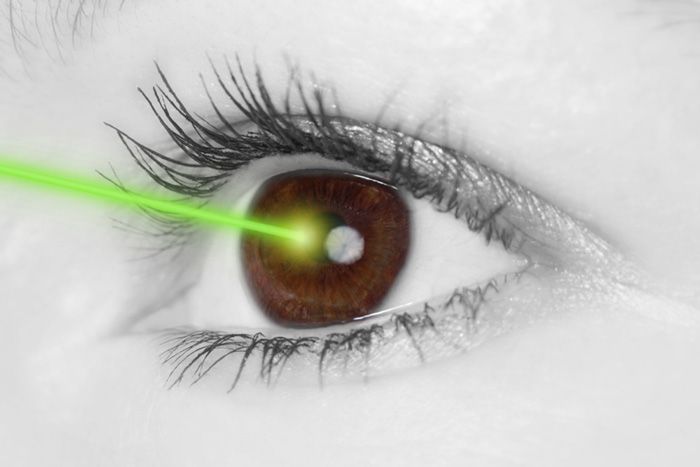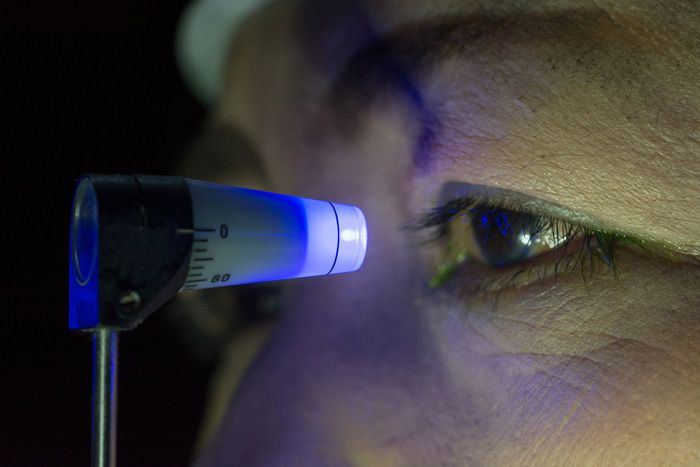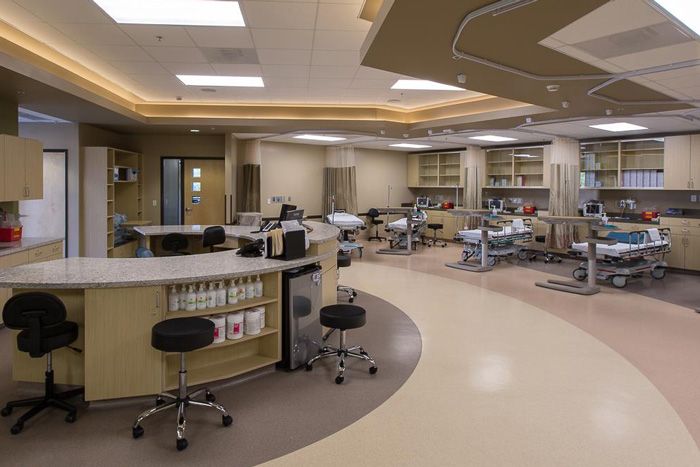

“EXCELLENT SURGEONS THAT ARE CARING PEOPLE, TOO!”
Clearer Vision, Closer Care
For LASIK patients seeking Clearer Vision and Closer Care, our local surgeons are committed to your customized treatment and a year of follow up care right in your hometown
LASIK Surgery Tucson – The #1 LASIK Eye Surgery in Tucson, Arizona!
Have you been struggling with your vision and relying on contacts or glasses? Have you been told you are nearsighted, farsighted, or have astigmatism? LASIK and other refractive surgeries offer the opportunity to reduce your reliance on corrective vision wear. Schedule a free screening to determine if LASIK can be a life changing opportunity for you!
Fishkind, Bakewell, Maltzman, & Hunter Eye Care offers the best in refractive surgery in all of Southern Arizona. Trust the doctors who have completed thousands of refractive surgeries:
-
Fellowship trained & Board Certified Refractive Surgeons
-
Customized Lasik & PRK Surgery in a state of the art facility
-
Visian ICL®: Implantable Collamer Lens Options
-
Refractive Lens Exchange (RLE) with Premium Lens Implants
-
Two Convenient Offices & a State of the Art Surgery Center
If you live in the Tucson or Oro Valley area, trust the vision experts at Fishkind, Bakewell, Maltzman, & Hunter Eye Care & Surgery Center.

What Are the Benefits of LASIK?
LASIK surgery has been around for a quarter of a century. As a time-tested method of correcting refractive errors, it has a high success rate. Up to 96% of patients meet their goals for their visual acuity after the procedure.
Another benefit of LASIK is the procedure’s ability to reduce or eliminate a patient’s need for corrective lenses. Many people no longer need glasses or contacts after having this type of eye surgery.
LASIK eye surgery is painless. After the procedure, you will need follow-up visits with your ophthalmologist to verify your eyes are healing properly and your vision is improving.
Lastly, even if your vision changes, you can still live without glasses. A skilled eye surgeon can make adjustments to your eyes with subsequent surgeries if your vision changes.
The Process
LASIK Eye Surgery in 4 Easy Steps
In our practice, LASIK is performed on an outpatient basis at the Arizona Eye Laser Center on Oracle Rd. Although the procedure itself takes only a few minutes to complete, you should plan to spend a couple of hours at the center. Some of this time will be spent preparing you and your eyes for the procedure, while a few minutes will be required afterward for postoperative instructions and departure preparation.
Before the procedure begins, a nurse or technician will talk to you about any immediate health problems that may affect your readiness for the surgery. At this point, additional eye measurements will be taken if you are undergoing wavefront LASIK (read about wavefront technology below). Anesthetic eye drops will be given to completely numb your eyes during the entire procedure.
Currently, we create most LASIK flaps using the IntraLase® laser.This advanced technology “femtosecond laser” allows the formation of a corneal flap of any shape and size with tremendous precision, virtually eliminating the blade-related complications of a metal microkeratome. All cutting is done by laser, with no sharp instruments ever touching the eye. IntraLase LASIK has now been approved by the U.S. military for Air Force pilots, and by NASA for astronauts due to its precision and safety.
You will be comfortably positioned under the IntraLase device and a suction ring will be moved into place around your eye. Using a vacuum, this ring will hold your eye perfectly still while the laser creates the flap, a process that takes about 10-15 seconds. During this time you might feel a slight pressure, but no pain, and your vision will be diminished. Once the suction ring is released, you will notice a diffuse haze over your vision as the flap fully develops over the following few minutes. The procedure is then repeated on your second eye, if both are being treated.
In occasional cases, a microkeratome might still be used to create the flap. The overall process is similar, with placement of a suction ring. The microkeratome, which functions somewhat like a carpenter’s plane with a rapidly oscillating blade, passes over the cornea to cut the flap. This takes about 10 seconds, with no pain.
Your eye is now ready for the final phase of LASIK- administration of the laser pulses to reshape the cornea. You will lie comfortably below the laser aperture and the area around your eyes will be prepared with a sterile cleanser. A plastic or paper drape will be placed around the eye, and a small eyelid separator will be placed to keep the eye open. Your surgeon will use an instrument to gently lift up and fold back the previously created corneal flap. You will not feel any discomfort. The surgeon will ask you to look towards a fuzzy, blinking red light above you. You do not need to worry about small eye movements, as the laser tracks the movement of your eye and adjusts its aim accordingly. It will stop firing completely if you move too far off track. As the surgeon activates the laser, you will hear a rapid “clicking” or “tacking” sound. Again, you should feel no discomfort whatsoever. The total number of laser pulses required depends upon the amount of refractive error being corrected, with most treatments completed within 10 to 15 seconds. When the laser is complete, your physician will irrigate away any debris with a sterile solution and then carefully reposition the flap. A contact lens may be placed on the eye to help the flap heal more quickly.
When the procedure is complete, antibiotic drops will be given and your surgeon will cover your eye with a clear plastic shield. For a short time after the surgery, you will not have much sensation due to continued numbness. However, later in the day you may experience some light sensitivity and a scratchy or dry sensation as though you have dust in your eye. This usually resolves within a few hours. You should plan to have someone drive you home from your procedure, as you will most likely be given medication to help relax prior to surgery.
You will return to our office the following day for a postoperative examination. The flap will be checked to assure that it is healing properly. If present, the contact lens will be removed at this time. Vision at this time is usually between 20/20 and 20/40, depending on the degree of refractive error corrected. Vision may continue to improve over the next few weeks before stabilizing fully. At this point you should be able to go about your business as usual… with one exception- no more glasses or contact lenses!
How to Choose A Good LASIK Eye Surgeon
As with all surgical procedures, you should thoroughly research your options to find the best surgeon for you. First, check to see if your routine vision insurance plan provides a discount with your surgeon or the facility. Additionally, you may qualify for financing with CareCredit, the nation’s leading patient payment plan.
Second, verify that your surgeon is local to your area and will be available for your post-operative care. The surgeon should follow your treatment and post-operative care for several months after your procedure.
Find a facility that has high-quality equipment and experienced surgeons and staff. Also, carefully research the experience of the eye surgeons you have under consideration. Find one who has a good rate of success over a long history of performing eye surgeries.
Our refractive coordinator is available to answer any of your questions regarding the procedure, pricing, and financing. We look forward to discussing the best vision options for your future!

See What Makes Our Tucson Eye Care Specialists Different
Hear What Our Customers Say
Meet Our LASIK Surgeons
See Now – Pay Later! Finance Your LASIK Procedure with CareCredit!

Why Our Facility Is a Great Eye Care Center for Your Eye Surgery
FAQ
LASIK Eye Surgery Questions & Answers
LASIK was initially approved by the FDA in 1995. Since that time, eye doctors around the country have been performing LASIK eye surgeries with few complications. Although there’s always some risk when it comes to surgical procedures, overall, LASIK is considered a safe and effective means of correcting refractive errors and improving your vision.
If you’re interested in LASIK, talk to your eye doctor about the qualifications. If you come to us, our ophthalmologists will review your medical history and conduct a comprehensive eye exam to evaluate your eye health and visual acuity to see if you would be a good candidate for this procedure.
In general, to be eligible for LASIK surgery, you must be at least 21 years of age, have good eye health, have a stable eye prescription for one year prior to surgery, and have no medical conditions requiring medications that can interfere with your healing. LASIK should also not be performed on pregnant or nursing women due to hormone fluctuations that affect their vision.
No. Your eye surgeon will put anesthetic drops in your eyes prior to your procedure to ensure you feel no pain. If you feel discomfort after the procedure, we can prescribe drops to minimize your discomfort and expedite your healing. Most patients feel fine within a few days.
We cannot guarantee every patient will attain 20/20 vision after LASIK surgery. However, most patients attain substantial improvement in their visual acuity, making it unnecessary to wear glasses or contacts for optimal sight.
We recommend not swimming or playing contact sports for the first few weeks after surgery. Other than that, you can resume your normal lifestyle and schedule. Patients usually experience visual clarity one to two days after the surgery. Your vision will continue to improve in the months ahead.
LASIK results will reduce or eliminate your dependence on contact lenses or glasses for optimal sight. Over time, you may experience age-related changes to your vision, and there is a possibility you may need reading glasses. We provide ongoing care and can offer enhancements and treatments to age-related changes if necessary.
Following surgery, most eye doctors will release you to go home after about 15 minutes. This is generally how long it takes for the anesthetic to wear off of your eyes. You will have a follow-up appointment with your doctor 24 to 48 hours after surgery to ensure your eyes are healing as they should.
You may experience burning and sensitivity for about 24 hours after the surgery. If you are still experiencing this sensation during your follow-up, you will want to let your doctor know. Outside of this, recovery is fairly easy. You will be given a steroid eye drop to use. This helps to strengthen the eye, while also keeping them moist. This drop should be used for a few weeks to a few months, based on your doctor’s recommendations.
Most people are able to see clearly within 24 hours of their surgery. However, the healing process can take up to six months to finish. As such, your vision may continue to improve or blurriness may slowly fade away, if present, during this time frame.



